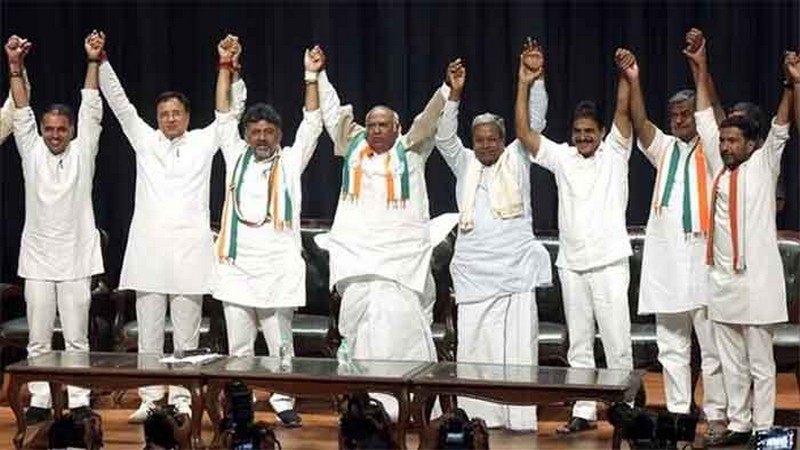By Nilofar Suhrawardy
Defying opinion polls predicting a hung assembly, clear victory of Congress in Karnataka elections sends strong signals at several levels. It is as yet too early to view electoral potential of Congress as finished. Negative campaign indulged in by rivals of Congress against Rahul Gandhi and his party colleagues have apparently failed to carry any appeal for people at grass-roots. Use of religious card to arouse aggressive fervour among voters and sway them to favour Bharatiya Janata Party (BJP) bears minimal electoral significance. Howsoever “effective” BJP-stalwarts’ fiery electoral speeches may appear to be, the limited electoral impact that they have on voters has been proved by their verdict in Karnataka. Extensive media coverage gained by these campaigns should not be expected to decide or even indicate who/what people choose to support.
Undeniably, people in Karnataka have voted extremely wisely and also shrewdly during these elections. Comparison of the present verdict with that of 2018 may be viewed as an indicator of this reality. Their turnout to cast votes – 73.19% was described by Chief Electoral Officer, Karnataka, as a “record.” The turnout in 2018 was 72.13%. Paradoxically, despite Congress having won more votes than BJP in 2018, it failed to win the needed number of seats. Congress and its allies won 38.14% votes against 36.35% won by BJP-led NDA. On its own strength, BJP failed to sweep the 2018 polls or even win the needed majority. The results led to a hung assembly with BJP as the single largest party. A different picture has been projected this time. Congress has been favoured by more than 43% voters against around 36% supporting BJP. In 2018, JD(S) won 37 seats on strength of around 18% votes. This time, JD(S) has won 19 seats with support of 13.3% voters.
Shrewdness of voters is marked probably by their choosing primarily to favour either Congress, BJP or JD(S) and not letting their votes be wasted by opting to vote for other parties, independents, etc. Had perhaps voters exercised a similar strategy in 2018, the results may not have led to a hung assembly then also. The importance of this fact is further supported by the present fight for 224 seats having been contested by 2,613 candidates of which 918 were independents and 685 from Registered Unrecognized Political Parties (RUPP). True, in 2018 also, around eight percent votes were not cast for either Congress, BJP or JD(S). What bears greater importance, as suggested earlier, is 92% voters’ decision not to let their votes be wasted. Clearly, statistics of a greater number having favoured Congress in 2018 polls cannot be dismissed lightly. It is possible, this reality was not ignored by voters. This is partly suggested by greater difference between votes won by Congress and BJP leading the former to sweep these polls. This is, however, one side of the Karnataka-verdict.
Equally significant is the statistical importance apparently given to 2018 results by Congress leaders. Decision to select Mapanna Mallikarjun Kharge as President of Congress was certainly guided with eye on winning Karnataka polls. Kharge’s Karnataka roots are marked by his having won Assembly elections for a record 10 times. The importance given to this state by Congress party at national level has probably been well received by voters in Karnataka. Even though nominally, at least, his being supported to head the post breaks the notions floated about only Gandhi family holding this authority.
Undeniably, Rahul Gandhi’s Bharat Jodo Yatra (Unite India March) has had a greater impact than expected on Karnataka results. He did not simply pass through the state, addressing a few rallies and similar gatherings. Nature of his march was marked by his literally reaching out to people and addressing them on issues which bear importance for them. The latter includes their economic problems. That this march was a crucial part of Congress campaign for Karnataka elections and coming parliamentary polls cannot be denied. Had the same march been timed just ahead of assembly elections, the impact may not have been the same. Congress has probably taken a leaf from BJP’s communication strategy, that of planning as well as working on its campaign a little ahead of elections. It has apparently learnt that rushing to states at virtually the last minute can be of little help in gaining electorally.
Seats gained by BJP in comparison with victory of Congress and its “success” in 2018 also sends several important messages. Against 104 seats won in 2018, BJP has managed to retain only 65 seats. Undeniably, BJP stalwarts spared no efforts to retain its hold in southern India. Perhaps little importance was given by BJP leaders to people’s verdict in 2018. Karnataka is not Gujarat. Nor it is in the Hindi belt. Besides, had BJP swept the polls in 2018 with more votes than its key rival, it may have signalled the importance this party’s communication strategy holds for people in Karnataka. The present results have signalled quite emphatically Karnataka voters’ refusal to be guided by religious cards used by BJP leaders, negative campaign against their rivals and so forth. Hype raised about its stalwarts had limited impact in 2018 and hardly any now. These are just a few indicators suggesting that BJP can no longer bank on its own communication strategies at least in assembly elections in South India. Electoral rhetoric fails to sway voters when they choose to exercise shrewd wisdom as they seem to have in Karnataka Assembly elections!
Nilofar Suhrawardy is a senior journalist and writer with specialization in communication studies and nuclear diplomacy.
14 May 2023
Source: countercurrents.org

